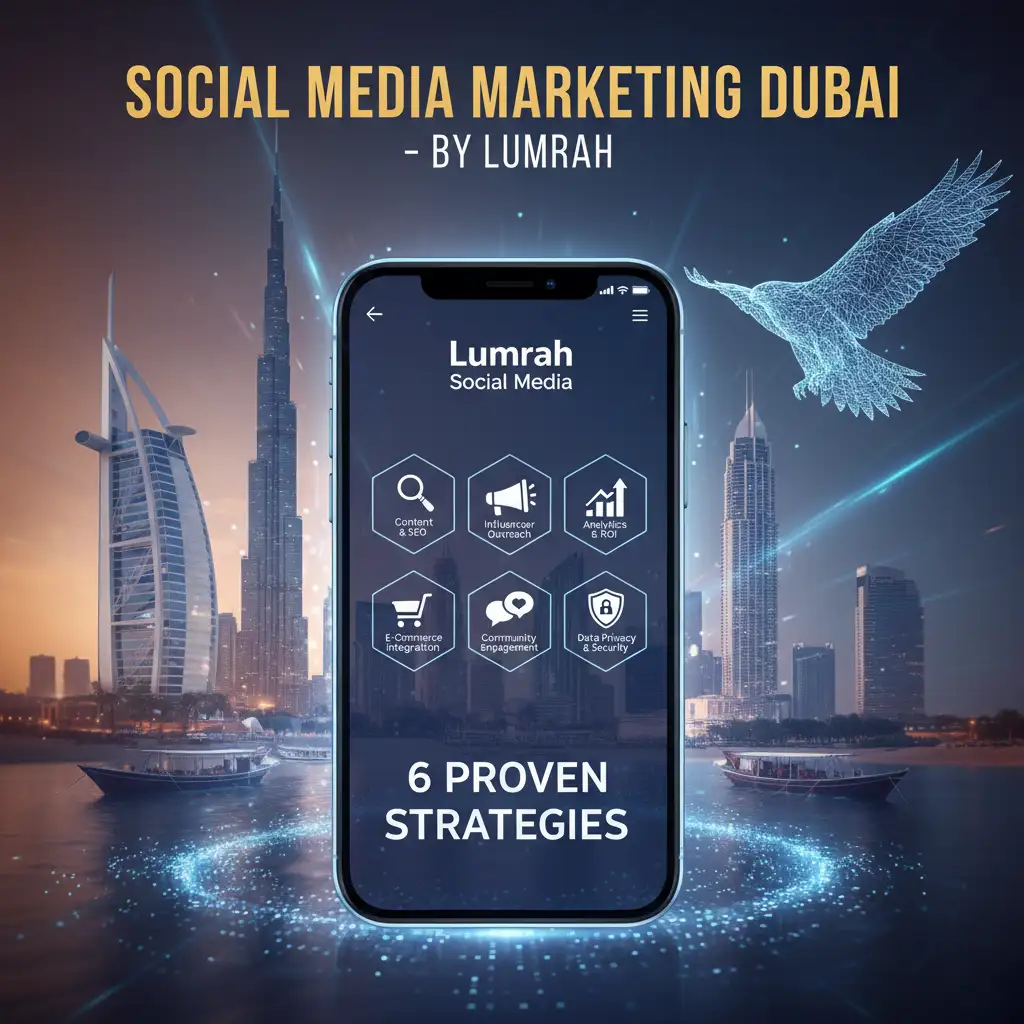Why social media matters in Sharjah & Dubai
Social media in the UAE isn’t just “nice to have”, it’s a primary channel where customers live, research, and decide. The UAE has some of the world’s highest social media adoption rates: recent national reports show virtually the entire internet-using population is on at least one social platform, and platform-specific reach numbers are enormous, making social advertising and organic content extremely effective for local businesses.
For businesses in Sharjah and Dubai this translates into three practical realities:
- Huge addressable audience. Platforms like Instagram and WhatsApp reach millions of UAE residents, Instagram’s ad reach in the UAE exceeded several million users in recent years, giving brands direct access to engaged audiences.
- Platform mix matters. WhatsApp and Facebook maintain very high penetration for messaging and discovery, while Instagram and TikTok are the best bets for visual storytelling and social commerce. Recent data shows very high WhatsApp usage alongside strong Instagram and TikTok numbers, design your approach around that split.
- Growing ad spend and programmatic activity. Marketers are investing heavily in UAE digital channels, national ad spend is growing year-on-year, reinforcing that paid social will be central to scaling campaigns. Expect higher competition in peak seasons (shopping festivals, tourist seasons) and plan budgets accordingly.
Why this matters to your business: social media combines discovery, trust-building, and direct conversion. Tourists and residents alike use social content to find restaurants, shops, services, and experiences, especially in Dubai’s tourism-heavy areas and Sharjah’s growing local commerce scenes. That means a well-planned social strategy will increase awareness, generate leads through chat-first channels (WhatsApp), and convert sales via social commerce or landing pages.
Quick takeaway: if you’re a business owner in Sharjah or Dubai, social media can be your most cost-effective growth channel, but only if you choose the right platforms, localize your content, and measure results tightly. Use Instagram/TikTok for brand & discovery, WhatsApp/Facebook for direct conversion, and LinkedIn for B2B partnerships.
Local differences: Social Media Marketing Sharjah vs Social Media Marketing Dubai
Although both emirates sit in the same country, the audience and business context differ in ways that change your tactics:
- Dubai: Tourist-heavy, luxury positioning, fast-moving trends, high competition. Content that showcases aspirational visuals, events, and influencer-led experiences performs strongly. Recent Dubai initiatives even include influencer training programs, an indicator of how official tourism and business bodies view social content as a driver of growth.
- Sharjah: More community-focused and locally-driven commerce. Sharjah-based audiences often respond well to practical content, Arabic-language posts, hyper-local promotions, and trust-building testimonials. For many Sharjah businesses, WhatsApp and Facebook groups are powerful referral engines.
Tactical adjustments:
- Tone: Dubai – polished and aspirational; Sharjah: warm, community, utility-first.
- Timing: align posts with local holidays, mall events, and Dubai’s tourist seasons.
- Language: bilingual posts (English + Arabic) broaden reach test Arabic-first content for Sharjah.
- Offers: time-limited experiences for Dubai visitors; loyalty & referral incentives for Sharjah residents.
Top platforms to prioritize (UAE)
- Instagram (visual discovery): great for restaurants, retail, travel experiences. Use Reels + Shopping. Instagram remains a cornerstone for brand-building in the UAE.
- TikTok (short-form virality): ideal if your product/service is visual and trend-friendly. Experiment with local sounds, challenges, and micro-influencers.
- WhatsApp Business (conversion & support): essential for local sales and customer service. Setup catalogs, quick replies, and link-to-chat CTAs from ads or organic posts. WhatsApp penetration is extremely high in the UAE, making it invaluable.
- Facebook (reach & older demographics): still strong for discovery and local groups; useful for marketplace and community campaigns.
- LinkedIn (B2B in Dubai): crucial for professional services, tech, and corporate offerings.
- Snapchat: popular among younger UAE users , consider for F&B and quick promotions.
Step-by-step setup for businesses (8 steps you can implement this week)
- Set clear goals (Week 0): Brand awareness, lead gen, footfall, or e-commerce? Use SMART goals.
- Define your local audience: Segment by emirate (Sharjah vs Dubai), age, language, tourist vs resident.
- Choose platforms: Pick 2 primary platforms + 1 support channel (e.g., Instagram + WhatsApp + TikTok).
- Create 3 content pillars: (a) Offer/Product, (b) Behind-the-scenes/Trust, (c) Community/Education.
- Make a simple content calendar: 3 posts/week + 2 Stories/Reels + 1 paid push.
- Set up measurement: Install pixel, UTM links, and WhatsApp click tracking; define 3 KPIs.
- Run a small paid test: 7–14 day campaign with clear CTA (catalog view, message, or landing page).
- Review & scale: After two weeks, measure CPA/CPL; double down on creatives and audiences that work.
Content strategy that converts (practical tips)
- Visual-first: Use bright, high-quality imagery for Dubai luxury slots; candid, relatable visuals for Sharjah.
- Localize copy: Short Arabic headlines + English captions increase reach. Test bilingual posts to see which drives better engagement.
- UGC & reviews: Share customer-generated stories and screenshots of WhatsApp praise, social proof converts in both emirates.
- Stories & Reels: Prioritize short vertical videos (Reels/TikTok) they have higher organic reach.
- Calls to action: For Sharjah, add “Message on WhatsApp”; for Dubai, “Book / Reserve / Shop now.”
- Content cadence: Post consistently, even small businesses benefit from 2–3 quality posts per week plus daily stories.
Paid social & budgeting for UAE markets
Digital ad spend in the UAE is growing rapidly; competitive windows (shopping festivals, Expo anniversaries) push CPMs up. Recent industry reports estimate significant ad investments across the UAE market in 2025, so expect paid strategies to be a major lever for growth.
Quick budgeting guide for small businesses (monthly):
- Test phase: $300 – $800 narrow targeting, 2 platforms.
- Growth phase: $1,200 – $3,500 scale best creatives, add remarketing.
- Scale phase: $5,000+ wider geo-targeting, influencers, multi-channel funnels.
Ad tips: Use catalog ads (for retail), message ads (for service bookings), and conversion campaigns with UTM tracking. Allocate 20–30% of your digital budget to creator partnerships during festivals.
Influencer & micro-influencer playbook
Micro-influencers (5k–50k followers) often deliver better engagement per dirham than mega-influencers. For Dubai, pick creators with tourism or lifestyle affinity; for Sharjah, prioritize local voices and Arabic-speaking creators. Always use clear deliverables, a content usage clause, and performance KPIs (reach + link clicks + conversions).
Compliance, brand safety & local rules
UAE has strict media and online conduct laws, avoid political commentary, respect cultural norms, and ensure promotional claims are accurate. The recent government activity around influencer training and platform governance underlines the need for careful content moderation. When in doubt, run legal review for campaigns with broad reach.
Case study / Storytelling: “Saffron Café” (fictional, practical story)
Saffron Café, a 12-seat Sharjah café, wanted more weekday customers. They launched a 6-week social plan: Instagram Reels showing the barista making a signature dessert, WhatsApp click-to-order menus, and Facebook neighbor-group promotions. After a small $500 ad push and a “friends get 10% off” referral, weekday footfall rose by 30% (fictional story to illustrate the approach). The lesson: mix organic storytelling + chat-first conversion and you’ll see local lift fast.
Tools & templates
- Content calendar (CSV): Date, platform, copy, visual, CTA, UTM.
- Analytics stack: Meta Ads Manager, Google Analytics with UTM, WhatsApp Business insights.
- Creative tools: Canva (templates), CapCut (short video edits), Buffer/Hootsuite (scheduling).
Frequently Asked Questions (FAQs)
Q1: Which is more important for small businesses – Instagram or WhatsApp?
A: Both serve different roles. Instagram builds discovery and brand; WhatsApp converts and provides direct customer support. Start with one discovery channel + WhatsApp for direct sales.
Q2: How often should I post in Dubai vs Sharjah?
A: 3–4 times/week on primary channels + daily Stories/Reels when possible. Dubai may need more trend-driven posts; Sharjah benefits from community updates and offers.
Q3: Are influencers worth the money in the UAE?
A: Micro-influencers often give the best ROI for local businesses. Use them for targeted, authentic campaigns rather than one-off paid shoutouts.
Q4: What budget should a small Sharjah shop expect to start ads?
A: Start with $300–$800/month for testing; scale to $1k+ when you have winning creatives.
Q5: Do I need Arabic content?
A: Yes, bilingual posts open you up to a wider local audience. Test Arabic-first for Sharjah audiences.
Q6: How can I measure ROI from social ads?
A: Track UTM-tagged landing pages, WhatsApp clicks, and conversion events (bookings, purchases). Use CPL and ROAS as core KPIs.
Q7: Any legal must-dos for Dubai campaigns?
A: Avoid sensitive topics, get contracts for influencer partnerships, and ensure claims (price, + offers) are accurate. If your campaign could be broad-reaching, get a quick legal check.
Conclusion & Quick Next Steps
Three actions to start today:
- Define your primary goal (awareness, leads, footfall).
- Pick two channels (e.g., Instagram + WhatsApp), set up tracking, and run a 14-day test.
- Localize content (Arabic + English), and allocate a small test budget to paid ads.
For a deep-dive national snapshot and platform reach numbers, see the Digital 2025 UAE report and recent platform analyses.



